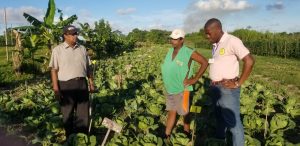The National Agricultural Research and Extension Institute (NAREI) has been encouraging farmers to practice Integrated Pest Management (IPM), an environmentally friendly approach to control pests and diseases.
The Institute successfully conducted a trial to control the Diamond Back Month in cabbage production. The experiment, which included no chemicals, was conducted on Mr. Deodat Seodat’s farm situated at Parika, East Bank Essequibo. The research team comprised NAREI’s Researchers Mr. Howard London, Ms. Oceana O’Deana and Anesha Stephen.

The DBM is probably one of the most studied insect pests in the world, yet it is one of the most difficult pests to manage. It has shown resistance to almost every insecticide. DBM is a highly invasive species. It originated in Europe, South Africa or East Asia, but is now present wherever cruciferous such as cabbage, kale, pak choy and broccoli are grown. The DBM larvae feed on the crops causing them to be unmarketable.
Our local farming community is affected by this pest. The presence of this pest warrants the excessive use of chemicals to salvage the crop. However, through NAREI’s recent research it was proven that this pest could be controlled without the use of chemicals.
According to Dr. Oudho Homenuath, Chief Executive Officer of NAREI, the result of this trial is very promising. The research was conducted using organic products, which were able to suppress the pest with similarity to the chemicals which are normally used by farmers. The team has additional work to do, but the objective is for NAREI to provide detailed guidance to farmers on an improved management approach for this pest.
NAREI is working to change the way in which farmers manage pest locally. Dr. Homenauth related that NAREI has been getting positive feedback from farmers who would have partnered with the Institute in this regard.
“Some farmers are interested in using these organic products even at this preliminary stage. Based on what they have seen, the farmers are convinced that cabbage can be produced without the use of chemicals. NAREI will continue to work towards addressing this pest issue,” He said.
The DBM is highly migratory and wind-borne adults can travel long distances to invade crops in other regions or even countries. Immature stages also hitchhike on plant parts and can establish in new areas. DBM costs the economy an estimated US$5B annually, but its impacts on local biodiversity and habitats in exotic ranges due to excess chemical use are unknown.



.jpg)








